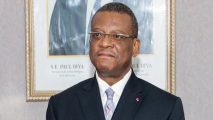Categories
Recent Posts
- Nigeria apologises over Burkina Faso military flight that saw 11 servicemen detained
- Cameroon eVisa platform flags abnormal bank charges on visa payments
- Football: Panthère du Ndé Wins Cameroon Cup 2025
- Fifa brings in new £45 ticket for 2026 World Cup
- President Sisiku Ayuk Tabe, top aides to appear before the Supreme Court
Archives
- December 2025
- November 2025
- October 2025
- September 2025
- August 2025
- July 2025
- June 2025
- May 2025
- April 2025
- March 2025
- February 2025
- January 2025
- December 2024
- November 2024
- October 2024
- September 2024
- August 2024
- July 2024
- June 2024
- May 2024
- April 2024
- March 2024
- February 2024
- January 2024
- December 2023
- November 2023
- October 2023
- September 2023
- August 2023
- July 2023
- June 2023
- May 2023
- April 2023
- March 2023
- February 2023
- January 2023
- December 2022
- November 2022
- October 2022
- September 2022
- August 2022
- July 2022
- June 2022
- May 2022
- April 2022
- March 2022
- February 2022
- January 2022
- December 2021
- November 2021
- October 2021
- September 2021
- August 2021
- July 2021
- June 2021
- May 2021
- April 2021
- March 2021
- February 2021
- January 2021
- December 2020
- November 2020
- October 2020
- September 2020
- August 2020
- July 2020
- June 2020
- May 2020
- April 2020
- March 2020
- February 2020
- January 2020
- December 2019
- November 2019
- October 2019
- September 2019
- August 2019
- July 2019
- June 2019
- May 2019
- April 2019
- March 2019
- February 2019
- January 2019
- December 2018
- November 2018
- October 2018
- September 2018
- August 2018
- July 2018
- June 2018
- May 2018
- April 2018
- March 2018
- February 2018
- January 2018
- December 2017
- November 2017
- October 2017
- September 2017
- August 2017
- July 2017
- June 2017
- May 2017
- April 2017
- March 2017
- February 2017
- January 2017
- December 2016
- November 2016
- October 2016
- September 2016
- August 2016
- July 2016
- June 2016
Featured
 2025 is the year when Biya’s long rule finally lost its last convincing justification
2025 is the year when Biya’s long rule finally lost its last convincing justification  Young Cameroonians: Build social capital to succeed
Young Cameroonians: Build social capital to succeed  Eulogy for HRH Nfor Professor Teddy Ako of Ossing
Eulogy for HRH Nfor Professor Teddy Ako of Ossing  Will Fr. Paul Verdzekov recognize the refurbished and rededicated Cathedral in Bamenda were he to return today?
Will Fr. Paul Verdzekov recognize the refurbished and rededicated Cathedral in Bamenda were he to return today?  Cameroon apparently under a de facto federalism
Cameroon apparently under a de facto federalism
Most Commented Posts
 4 Anglophone detainees killed in Yaounde
4 Anglophone detainees killed in Yaounde
18 comments Chantal Biya says she will return to Cameroon if General Ivo Yenwo, Martin Belinga Eboutou and Ferdinand Ngoh Ngoh are sacked
Chantal Biya says she will return to Cameroon if General Ivo Yenwo, Martin Belinga Eboutou and Ferdinand Ngoh Ngoh are sacked
13 comments The Anglophone Problem – When Facts don’t Lie
The Anglophone Problem – When Facts don’t Lie
12 comments Anglophone Nationalism: Barrister Eyambe says “hidden plans are at work”
Anglophone Nationalism: Barrister Eyambe says “hidden plans are at work”
12 comments Largest wave of arrest by BIR in Bamenda
Largest wave of arrest by BIR in Bamenda
10 comments
Latest Tweets
Featured
-

Nigeria apologises over Burkina Faso military flight that saw 11 servicemen detained
-

Cameroon eVisa platform flags abnormal bank charges on visa payments
-

Football: Panthère du Ndé Wins Cameroon Cup 2025
-

Fifa brings in new £45 ticket for 2026 World Cup
-

President Sisiku Ayuk Tabe, top aides to appear before the Supreme Court
-

Pressure mounts on Biya as speculation grows over possible replacement of Ngute
-

2025 is the year when Biya’s long rule finally lost its last convincing justification
© Cameroon Concord News 2025
20, January 2017
African Commission on Human and Peoples Rights releases statement on the situation in Cameroon 0
Press Release on the Human Rights Situation in Cameroon Following strike actions of Lawyers, Teachers and Civil Society
The African Commission on Human and Peoples’ Rights (the Commission) continues to follow closely the deteriorating human rights situation in Cameroon, State Party to the African Charter on Human and Peoples’ Rights (the African Charter) caused by the ongoing protests in the English speaking North West and South West regions of the country.
The Commission’s Country Rapporteur for Cameroon and Special Rapporteur on Human Rights Defenders in Africa, Hon. Commissioner Reine Alapini-Gansou, is deeply concerned by the deteriorating human rights situation in Cameroon, in particular: killings of civilians; the deployment of armed military personnel, special security forces (BIR) and war machines to these two regions; the disproportionate and deathly use of force and violence to dispel peaceful and unarmed Lawyers, Teachers, Students, civilians and protesters in Bamenda, Buea and Kumba; the raping of students in Buea; the arbitrary arrests, detention and merciless beatings orchestrated by the police, gendarmerie, military and the BIR following strikes and protests that have been going on since October 2016.
The Special Rapporteur has received information that the strikes and protests are allegedly provoked by what has been dubbed, “the Anglophone problem,” due to discontented Anglophone Lawyers, Teachers and Civil Society in English speaking Cameroon legitimately and peacefully seeking a halt to: the gradual, but systematic destruction and obliteration of the Common Law Legal System and the Anglosaxon System of Education; the marginalisation and neglect by the administration of Cameroon of the two English speaking regions of Cameroon; and the return to Federal system of governance.
The Special Rapporteur is particularly concerned about the alleged deaths of more than nine (9) Cameroonians during the protests in Bamenda, Buea and Kumba, and the allegations that the Government is planning mass arrest, kidnappings and assassination of leaders of Lawyers’ associations, Teachers’ unions, Civil Society and human rights defenders as a means to thwart the Anglophone cause.
The Special Rapporteur condemns very strongly the alleged use of disproportionate force against civilians, the violent and deathly suppression of peaceful demonstrators and calls on the Government of the Republic of Cameroon to:
The Special Rapporteur would like to remind the Cameroonian authorities of their obligations to guarantee fundamental rights, including the right to life, the right to freedom of assembly, association and expression as well as the right to self-determination as provided in Articles 6, 7, 9, 10, 11 and 20 of the African Charter.
The Special Rapporteur also calls on the international Community to look into the matter and support the Government of Cameroon in the peaceful resolution of the “Anglophone problem”; by encouraging genuine and inclusive dialogue between the Government of Cameroon and the Cameroon Common Law Lawyers, Teachers, and Civil society in the Anglophone regions and other such bodies established to resolve the issue.
The Special Rapporteur will continue to monitor developments in the Northwest and Southwest regions of Cameroon and calls on the African Union to contribute towards the effective realization of human and peoples’ rights in the country as a whole.
Done in Banjul-The Gambia
Honourable Commissioner Reine Alapini-Gansou
Country Rapporteur for Cameroon and Special Rapporteur on Human Rights Defenders in Africa